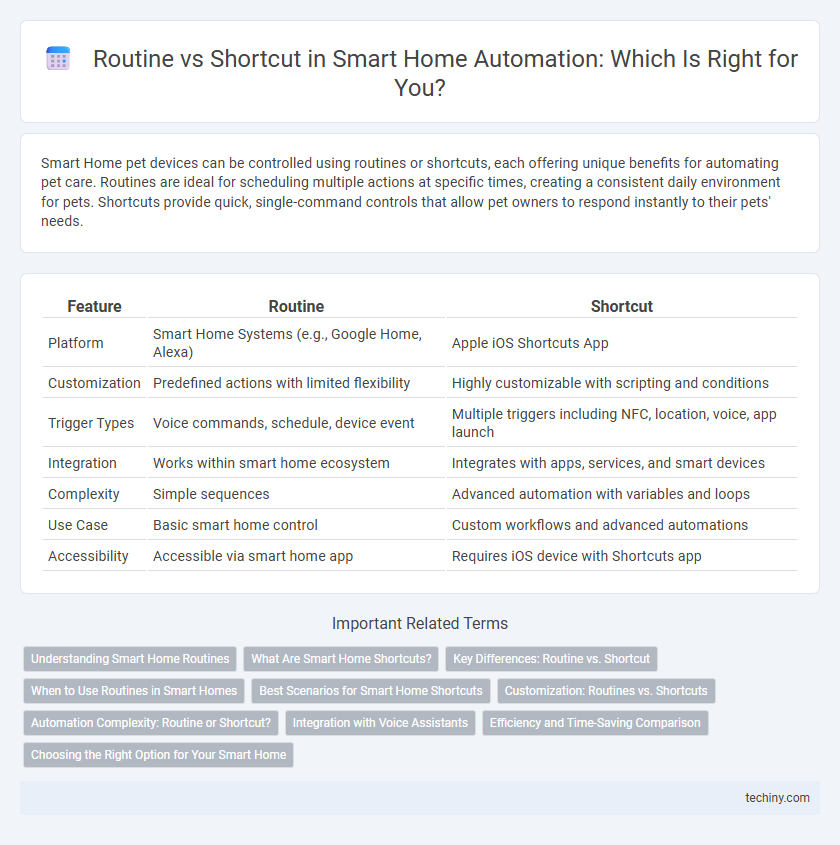Smart Home pet devices can be controlled using routines or shortcuts, each offering unique benefits for automating pet care. Routines are ideal for scheduling multiple actions at specific times, creating a consistent daily environment for pets. Shortcuts provide quick, single-command controls that allow pet owners to respond instantly to their pets' needs.
Table of Comparison
| Feature | Routine | Shortcut |
|---|---|---|
| Platform | Smart Home Systems (e.g., Google Home, Alexa) | Apple iOS Shortcuts App |
| Customization | Predefined actions with limited flexibility | Highly customizable with scripting and conditions |
| Trigger Types | Voice commands, schedule, device event | Multiple triggers including NFC, location, voice, app launch |
| Integration | Works within smart home ecosystem | Integrates with apps, services, and smart devices |
| Complexity | Simple sequences | Advanced automation with variables and loops |
| Use Case | Basic smart home control | Custom workflows and advanced automations |
| Accessibility | Accessible via smart home app | Requires iOS device with Shortcuts app |
Understanding Smart Home Routines
Smart Home routines automate multiple actions triggered by specific events, such as turning off lights and adjusting thermostats at bedtime, streamlining daily tasks effortlessly. Unlike shortcuts, which perform single or quick tasks via voice commands or app buttons, routines integrate several commands into one seamless sequence for enhanced convenience. Understanding Smart Home routines enables users to customize their environment, improving energy efficiency and personal comfort through tailored automation.
What Are Smart Home Shortcuts?
Smart Home Shortcuts are predefined command sequences that automate multiple tasks with a single trigger, simplifying daily interactions with connected devices. Unlike routines that often run on schedules or conditions, shortcuts activate instantly through voice commands, app buttons, or widgets. These shortcuts enhance convenience by merging various smart home actions, such as adjusting lighting, temperature, and security settings simultaneously.
Key Differences: Routine vs. Shortcut
Routines automate multiple smart home actions triggered by a single command or event, enhancing daily convenience by combining tasks like adjusting lighting, setting thermostats, and activating security systems simultaneously. Shortcuts streamline individual tasks within smart home ecosystems, enabling quick execution of specific functions such as turning on a light or playing music with voice commands or widgets. The key difference lies in Routines managing complex sequences across devices, while Shortcuts control singular, targeted actions for faster interaction.
When to Use Routines in Smart Homes
Routines in smart homes are ideal for automating daily tasks that follow a predictable schedule, such as turning on lights at sunset or adjusting the thermostat when leaving for work. They efficiently manage multiple devices through a single trigger, enhancing convenience and energy savings. Use routines to streamline repetitive actions that improve comfort and security without manual input.
Best Scenarios for Smart Home Shortcuts
Smart Home Shortcuts are ideal for automating quick, single-action tasks such as turning off all lights, adjusting the thermostat, or locking doors with a simple voice command or tap. These shortcuts enhance convenience by streamlining repetitive daily commands, making them perfect for users seeking fast, on-demand control over specific devices. Unlike routines, which manage complex sequences triggered by time or events, shortcuts prioritize immediate execution of frequent, straightforward actions.
Customization: Routines vs. Shortcuts
Routines in smart home systems offer structured automation by triggering multiple actions based on specific conditions or times, enabling users to customize daily schedules efficiently. Shortcuts provide highly personalized control by allowing users to create single-tap commands or voice-activated sequences tailored to specific tasks or preferences. Both features enhance home automation, but routines excel in broad, timed automation while shortcuts shine in quick, user-defined customization.
Automation Complexity: Routine or Shortcut?
Routines offer customizable automation with multiple triggers and actions, ideal for complex smart home setups requiring sequential device control. Shortcuts excel in simplicity and speed, perfect for single-action commands or integrating third-party apps with minimal configuration. Choosing between routine or shortcut depends on the desired automation complexity and user preference for flexibility versus ease of use.
Integration with Voice Assistants
Routines offer seamless integration with voice assistants like Amazon Alexa and Google Assistant, enabling users to automate multiple smart home actions with a single voice command. Shortcuts provide personalized voice triggers through Apple's Siri, allowing tailored control of individual devices or complex tasks within the Apple Home ecosystem. Both methods enhance smart home convenience by streamlining device control through intelligent voice interaction.
Efficiency and Time-Saving Comparison
Routines in smart homes automate multiple actions triggered by a specific event, maximizing efficiency by handling complex sequences without manual input. Shortcuts streamline single or few-step tasks, offering quicker execution but less automation depth compared to routines. Prioritizing routines generally results in greater time savings for repetitive, multi-device operations, while shortcuts excel in on-demand, simplified commands.
Choosing the Right Option for Your Smart Home
Choosing between a routine and a shortcut depends on the complexity of your smart home needs and desired automation frequency. Routines offer multi-step automation triggering various devices simultaneously, ideal for daily schedules, while shortcuts provide quick, single-action commands for immediate tasks. Prioritize routines for comprehensive control and shortcuts for simplicity and speed in managing your smart home ecosystem effectively.
Routine vs Shortcut Infographic

 techiny.com
techiny.com